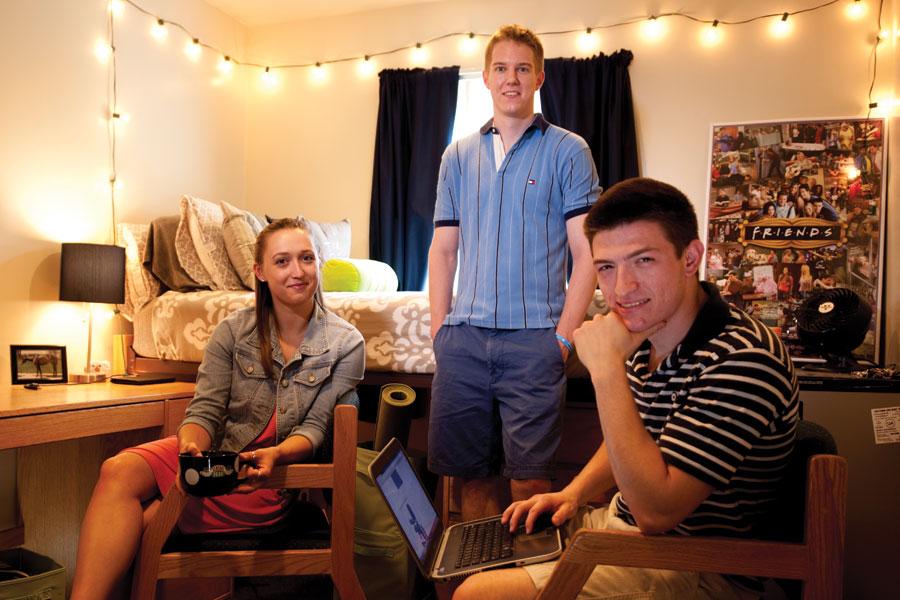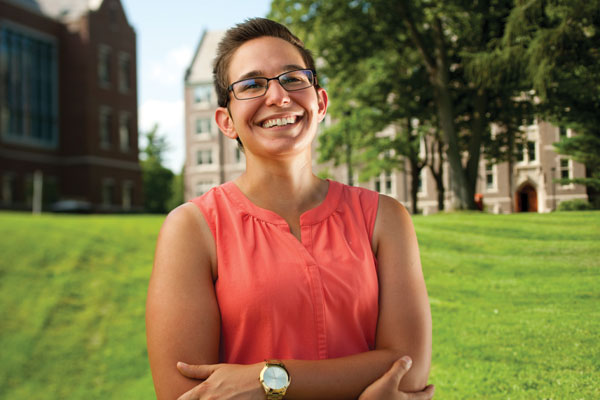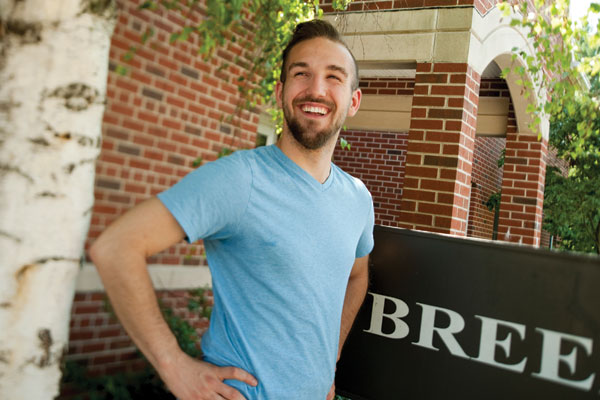FEATURE
Stand Up (or Sit Down) and Lead
A new campus program encourages students to develop their leadership potential
by Joanie Eppinga

L to R: Resident Assistant (RA) Taylor Wroblewski '16, Brett Stokoe '15G, and Njyhalo Pavati '14, '17G
Nelson Mandela. Winston Churchill. Mother Teresa. These are names associated with powerful leadership. But what if your best example of leadership is your mom, or your fourth-grade teacher, or the kid down the street?
Those involved in Nazareth’s new leadership certificate program, part of a larger student leadership initiative, know that leadership takes many forms. Director of Student Activities and Leadership Carey Backman, who oversees the program, says, “We don’t need students to describe leadership in the exact same way. We want them to say what it means to them.”
According to Backman, an effective strategy for expanding students’ notions of leadership is to ask them who they consider to be a leader. “Very often,” she says, “they say, ‘my dad,’ or ‘my uncle,’ or ‘my grandma.’” After exploring what makes those people good leaders, Backman says, students no longer feel bound to the concept of a leader as the head of an organization, company, or country.
She notes, “Sometimes the very first step in shifting their understanding is to let students know they can be leaders—and then helping them develop that belief system.” One person who developed that understanding is Jennifer Lachell ’15, one of three inaugural participants in the program.
“When I graduated from high school I was shy,” says Lachell. “I was one of the quietest kids in class. Being involved in the leadership program helped me become confident.”
Backman confirms Lachell’s story. “Jennifer was very unsure of herself,” she says. “She’s grown a huge amount in the years I’ve known her. The components of the leadership program are responsible for a good portion of that.”
Lachell, who graduated last spring and is a sales development representative at Skyhigh Networks, nods. “The leadership training has really carried over into my career,” she says. “I’m more professional at a younger age. If I encounter a problem, I can think it through logically and make a strategic decision.”
The program that had such a positive effect on Lachell’s life is part of a larger student leadership initiative. The overarching initiative aims to encourage student leaders to focus on their commitment to diversity and apply their leadership skills beyond Nazareth College’s open doors. Backman believes it helps students discover new themes and thoughts through special events, such as an annual conference, as well as through the leadership program.
The program involves earning three sequential certificates, each requiring that students take core workshops, an elective, and a service component. The first certificate, called Emerging Leader, focuses on personal empowerment and the acquisition of leadership skills, such as public speaking and active listening. The second, Engaged Leader, emphasizes learning to lead in group settings through workshops on topics like group dynamics and strategic planning. The third, Established Leader, challenges students to take their learning into the wider world and requires that they complete a capstone project or presentation.
By promoting participation in clubs, organizations, sports teams, student government, and other activities, the leadership program allows students to develop their skills in a variety of ways, thereby preparing them for internships and careers.
Communication skills, group work, constructive criticism, and trade competence are strongly emphasized within the program, thus ensuring that students are ready for the future. “Nazareth prides itself on its career preparation,” Backman says. Students practice the skills by participating in whatever activity appeals to them. “It’s knowledge plus application,” she notes.
Kevin Worthen, vice president for student development, agrees. He says that whether students go on to graduate schools, internships, jobs, or leadership roles in civic organizations, “their active participation in this program will provide the platform and vocabulary for discussing their leadership development over time.”
To ensure that the leadership program is relevant to life beyond Nazareth, Backman says, members of the leadership team take two steps. First, they work with the Career Services Office. Second, they confirm that the program aligns with the experiential learning component of a Nazareth education in which students develop, reflect upon, articulate, and apply their personal social values.
One way students can fulfill their experiential learning requirement is to earn a leadership certificate. “The two programs incorporate similar values and have the same structure,” says Backman. “For example, for a program to count for experiential learning, it must have a reflective component: you have to consider your experience—how it affects you now and will influence your thinking later. In the same way, every time students take a leadership workshop they have to reflect and address questions about how they’ll use what they learn beyond college.”
The program emphasizes that leadership is not just about individual capability. “We help our students understand who they are as leaders within the context of a group setting,” says Backman. Because its focus is on leadership in an interpersonal context, the program is based on relational leadership. According to the Handbook for Student Leadership, relational leadership is a “relational and ethical process of people together attempting to create positive change.”
For Stephanie Adams ’15, another inaugural student who is now a Fulbright Scholar teaching English in Taiwan, the relational model was a good fit. In her personal leadership statement, Adams noted that her understanding of leadership involves “constant learning and evolving through direct contact with others.”
But relationships with others aren’t the only ones that matter. The program also highlights the importance of students’ relationships with themselves. “Self-awareness is really at the root of how the students develop their approach,” says Backman.
That aspect of the program resonated with Adams as well. “I was prompted to complete the certificate because I wanted to find out more about myself as a leader, including my own leadership style,” she says.
Worthen also acknowledges leadership style differences among students. “Some students will recognize that instead of being in charge, they’d rather be a good supporter,” he says. “That’s a nuance about themselves students may discover through the program.” Backman says the goal is to have students say, “I know this about myself and this is how I put it all together.”
At the same time that the program encourages students to discern what their own leadership style is, it also teaches them what leadership is not. “Most students come in understanding leadership as a position,” says Backman. “What we’re teaching is that it’s the behavior and the work rather than the position that helps you develop your leadership abilities.” She notes that students are surprised when they realize that leadership isn’t necessarily indicated by a title.
Another revelatory concept the program emphasizes is that leadership can be learned. Backman says she had one student who insisted that leadership was inherent and that a person can’t do anything to develop it. “I tease him about that now,” she says, “because he has become a facilitator of one of our leadership workshops.” Those workshops include tactics for handling conflict, inclusion, diversity, and many other elements of leadership.
Learning about these facets of leadership is intriguing for students because of Nazareth’s personalized approach. “The program is customizable to allow them to build on strengths while filling gaps,” says Worthen. “It has core elements, but also contains electives they can use to explore their particular interests. And they can move through it at their own pace. As a result, content and timing are both individualized.”
Nazareth is able to take a personalized approach to leadership studies because it’s not a huge school, Worthen says. “Our size really helps us out in this regard,” he notes. “Students can develop and nurture those relationships, both with faculty and staff on campus and with trustees in the community, at a more intimate level.” Worthen offers an example of the personalized approach: Nazareth President Daan Braveman facilitates one of the workshops. “To have that kind of access, not only to the College’s leadership but to the lessons of leadership that he will share, is quite special on any college campus,” he says.
“This program is going to be one of those wonderful things our students will discover,” Worthen notes. “I think when alumni meet they’ll say, ‘You graduated from Naz? Did you do the leadership program?’” Unlike other institutions, many of which offer leadership programs to their students, Nazareth aims to include all students in its program, regardless of difference in leadership style.
The program’s added value means Nazareth will be expanding it almost exponentially over the next five years, says Worthen. “I believe we’ll find that as we continue to grow the program, our students will demand and expect more from it.”
As the program matures, so will the students it serves. “For us,” says Backman, “what’s really important is for them to believe they can lead. We’ll develop that by helping them understand who they are—strengths, abilities, what they still need to learn.”
In other words, to benefit from Nazareth’s leadership program, students don’t need to be Nelson Mandela or Mother Teresa; they just need to be students at Nazareth.
“Anyone can be a leader,” says Backman. “You don’t need to be particularly loud or visible. Just participate!”
Joanie Eppinga is a freelance writer and editor in Spokane, Washington. Additional reporting was provided by Taylor Wroblewski '16.

Jennifer Lachell '15, graduate of the leadership program

RA Corey Rainboth '16 chose to live in a freshman dorm because "i love helping students coming on campus, showing them resources to use."